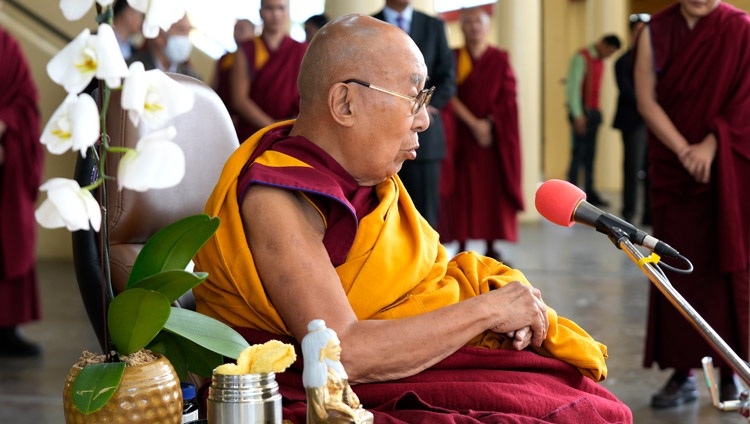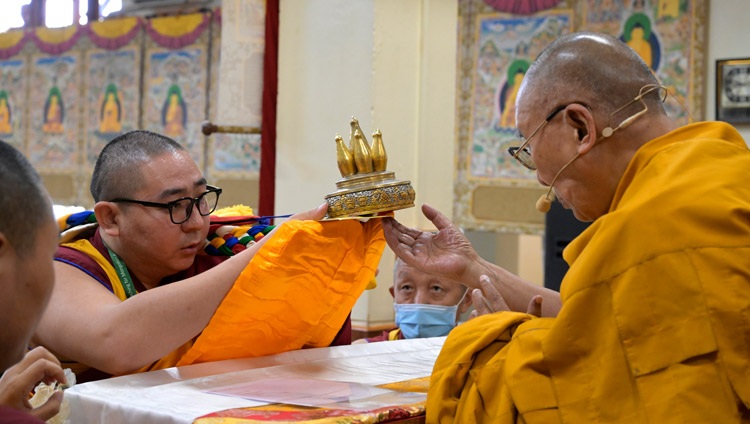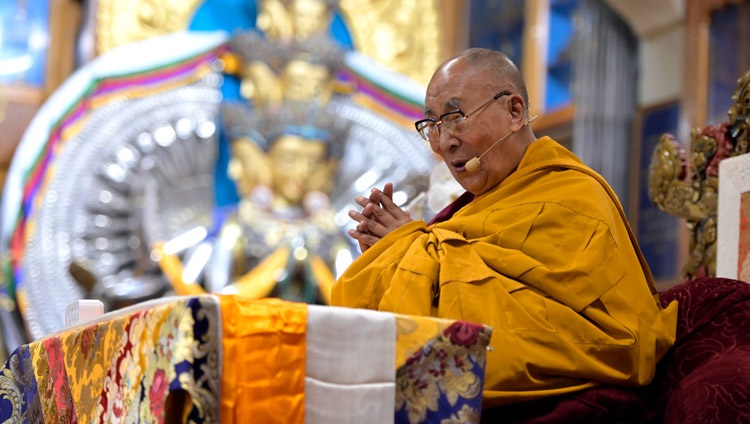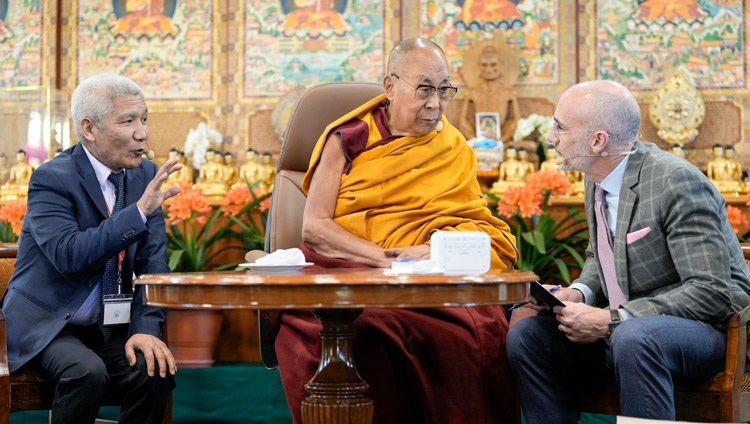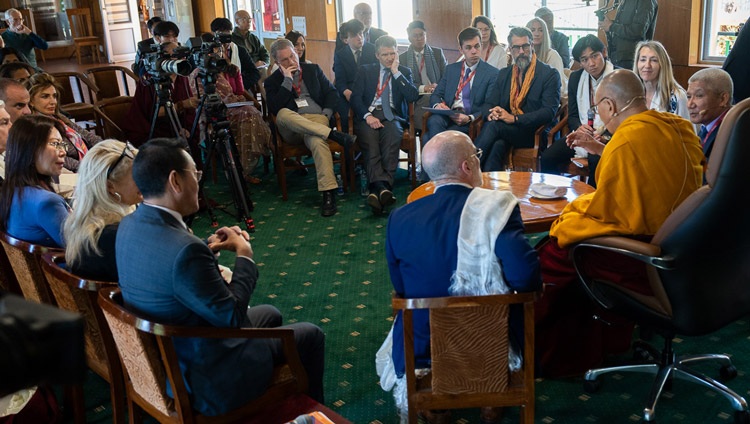Translation of His Holiness the Dalai Lama’s remarks to Tibetans at Salugara
Two years ago, I took retirement from my political responsibility. In addition to my personal retirement, it also ended the nearly 400-year old system, established from the time of the Fifth Dalai Lama and followed by the successive Dalai Lamas, of being both the spiritual and temporal ruler of Tibet. This system proved useful during its time, now the time has changed. Even in the future, when the time comes for the Tibetans in exile and Tibet to be living together, I had already mentioned long time back that there would not be a situation where we will be at the helms. Not only that, even whether the institution of the Dalai Lama will exist or not, is needed or not, will be decided by the concerned people at that time. I have said that as early as 1969.
Since around 12 years back, I have been in semi-retirement, with our political leadership being appointed through elections since 2001. Thereafter, my status had been that of a semi-retirement. Around two years ago, we saw the completion of two five-year terms (for ten years) of the elected Kalon Tripa. During the elections, Tibetans in different countries were paying good attention and taking good responsibility in the election process. Therefore, I felt the time had come for my complete retirement, ending (as we Tibetans would say, in a good era and in a good way, and with auspiciousness) the system of Gaden Phodrang assuming political responsibility.
This did not happen unwillingly, but took place happily, joyously and voluntarily. Leaders that I know, whether in India, the United States or other places, have all commended my decision saying it was very good.
Among Tibetans, while the immediate reaction has been that of uneasiness, yet after the reasons for this have been explained everyone has concurred. Since the current period is one where we are struggling for freedom, our proceeding 100 per cent on the democratic path has only strengthened the power of the struggle. It has increased the opportunity for support from across the world. We are not holding on to the old system, like an old dog holding on to a bone, but rather we are implementing progress and changes with the times. Therefore, there have been many benefits.
I have taken such a decision not because I have become discouraged, nor have I relinquished the authority because I have lost hope for the cause of Tibet. So I would like to tell you all not to worry about it.
The Tibetan struggle is not for the cause of a few Tibetans; it is a struggle for the just cause of the entire Tibetan people, and the Tibetans inside Tibet are the primary in this. I have always stated that I consider myself as the free spokesperson of Tibetans inside Tibet, rather than their leader or someone who gives order to them.
Therefore, it was my responsibility to explain the aspirations of the Tibetan people, and the real situation inside Tibet. It is my responsibility to place the aspirations of the Tibetans in Tibet before other people. Tibetans living inside Tibet continue to have remarkable courage and determination.
Secondly, the territory under the then Gaden Phodrang government only included Tibetans living in areas of U and Tsang, and parts of Dhotoe, on this side of the Drichu River. But today, there is a great and astounding sense of unity amongst Tibetans in all Dhotoe, Dhomey, and U-tsang [three traditional provinces of Tibet]. In the seventh, eighth and the ninth centuries, during the time of the religious kings, Tibetans from the three provinces were subjects of one King. Around the ninth century, when Tibet began to break up, there was political disintegration. Although in terms of religion and culture they continued to be one, politically it had waned greatly.
Today, however, on account of many external and internal factors, there is an admirable sense of Tibetan unity and Tibetan-ness. Much attention is being paid to one’s religion and culture. Likewise, those of us in exile have, under much difficulty in the past more than fifty years, remained steadfast in our courage and altruistic disposition. In the process of accepting the challenges we have shown remarkable distinction compared to other similar refugee communities. We don’t have to pronounce this ourselves as many people who work with refugee communities and know Tibetans, have made this observation. This is primarily the fruition of the altruistic disposition and courage of the greater Tibetan people who faced the challenges. In this connection, today, I would like to thank the Tibetans from Kalimpong, Darjeeling and Gangtok. You have all been enthusiastic to date and done well. I thank you for from the bottom of my heart for your zealousness. You all are able to represent the greater Tibetan people well. Thank you.
In terms of an approach to resolve the Tibetan issue in the future, in 1974 we decided on a policy — not in the spirit of “I win, others lose,” but being of benefit to the Chinese Government and also to the Tibetan people – which is the mutually beneficial Middle Way Approach.
In late 1978 and 1979 there was a situation when we had direct contact with Deng Xiaoping and the Chinese Government under his leadership. It was easy for us to establish this contact with the Chinese Government then because we had already decided on a mutually beneficial approach a few years earlier.
Following the harsh policy imposed all over China in the 1980s, when the democracy movement came to China, the Tibetans also experienced harshness under that overall policy. Otherwise, during Hu Yaobang’s time there was great hope. But Hu Yaobang was dismissed. Thereafter, Zhao Ziyang also was not able to achieve anything. Thus, it was somewhat like our misfortune that our contact with the Chinese Government did not result in anything concrete.
At the same time, inside Tibet, when the series of protests as a result of desperate attempt to air grievances were becoming bigger, there was violent suppression, and the situation is heartrending currently.
However, in the past several years, more than 20 and 30 years, and especially after the 2008 protests, I have been meeting many Chinese; Chinese intellectuals and students (I have met several thousand students who are studying in the United States and Europe, etc.). In terms of Chinese intellectuals, there have been many prominent ones who have come to meet me. Also, we have had regular discussion sessions with Chinese scholars. Among these Chinese intellectuals and students, some of them after hearing our explanation of the Middle Way Approach, express understanding and are greatly elated. In essence, there has been strong support from among the Chinese people to our Middle Way Approach.
Around last year, I received a hand written letter in Chinese from a Chinese living in Beijing. He was an intellectual. He said that in the past although he knew the Dalai Lama was a spiritual leader, he considered him a political separatist. However, he went on a pilgrimage to Wu Taishan where he met a [Tibetan] monk from India (who was on a pilgrimage there) who spoke good Chinese. When the monk explained the Dalai Lama’s effort to resolve the Tibetan-Chinese problem through the Middle-Way approach, the scholar had written that he felt that this mutually beneficial solution would be supported by 100 percent of the people in China, if only they knew. This is a factual development.
Whatever it is, I have been meeting many Chinese. All of them hold the Middle Way Approach in great esteem saying this is also of benefit to China. They are greatly pleased. At the official level, the Chinese government has not budged, but if we ask: Is the government important or are the people important? Obviously in the long run, people are more important.
Our mutually beneficial Middle Way policy continues to attract widespread support among the Chinese people, particularly from intellectuals like Liu Xiao Bo in China. It is also admired and supported by many Chinese intellectuals and democracy activists in the US. And most importantly, my fellow Tibetans in Tibet, intellectuals, writers, artists, teachers, etc: I have met hundreds of them. They say that all Tibetans may want independence in their heart, but we need to see what is achievable and what can resolve the current problem. Therefore, the mutually beneficial Middle Way Approach is rational that can be explained to Chinese and that can be discussed.
I have met many Tibetan intellectuals from inside Tibet and none among them has suggested that we proceed on the path of independence. We do have the rights. The situation is clear if we look at the 7th, 8th and 9th centuries. From the time of our religious kings, it has been said that Tibetans will be happy in Tibet and the Chinese will be happy in China. With a distinctlanguage and script, we have a different tradition and are a separate people.
However, the world is changing now. If we look at China, when the previous Dalai Lama was returning to Tibet after being in exile in India, the Chinese Emperor was no longer there and revolution was beginning. Even in his testament, his remarks, the previous Dalai Lama had said that China had then become like a pond whose water source had dried up. Today, China is not a pond whose water source had dried up. These days, some people seem to say that the previous Dalai Lama had done like this and the 14th Dalai Lama is not capable enough. We have to think carefully. We have every right to claim independence, but Tibet is in a critical situation now. We have different language, culture, and tradition, and if we gradually really think on a mutually beneficial solution; for example, I usually ask the Chinese to look at the situation in India. The East, South, West, and the North of India have different languages, different scripts, but there is no risk of separation as everyone receives equal facilities, and because there is rule of law, democracy and freedom. Tibet has different language and script and if the Chinese treat Tibetans, as they talk about brethren nationalities, respect, love and provide equal rights, Tibetans will also consider accordingly. This is because we, too, need to consider our interest at the broader level.
Occasionally, I have been saying this clearly and I wanted to say this here today. Among Tibetans in exile, as also those from Tibet who stay in India for few months, there are those who depart for the United States and Europe. They do so not out of concern for religion, but for dollars. So, Tibetans need money and finance. Therefore, rather than living poorly in independence (which we cannot achieve), if Tibetans get good economic development by living within the People’s Republic of China, and at the same time if we can preserve and promote our language, religion and culture. In particular, China today has around 400 -500 million Buddhists, and every week ten to twenty mainland Chinese Buddhists come to Dharamsala. When we meet them, most of them cry and urge me not to forget the Chinese Buddhists. Although there are difficulties, many Chinese also attend important teachings when there are Chinese translators, like thousands of Mainland Chinese pilgrims visited Bodhgaya last year during the Kalachakra teachings. Even in the past, many Chinese emperors have been enamored by Tibetan religion and culture and have become Buddhists, and practiced Tibetan religion. In the future, too, many Chinese will be interested in Buddhism, in particular Tibetan Buddhism. Even today, there are many Chinese showing interest in Tibetan Buddhism.
Therefore, we have to think from a broader perspective. China is economically a powerful country and so we need to see how we can benefit from that. From the religious and cultural perspective, in addition to preserving and promoting Tibetan religion and culture, if we can help hundreds of millions of Chinese Buddhists, it also benefits the Buddha Dharma as also the individual people. This is mutually beneficial.
So, you must understand that the Middle-Way Approach has concretely yielded some fundamental results. The issue of not having any results by talking to Chinese government is from only one aspect. It cannot represent the entire aspect. If we look at it from a wider perspective, from the people level, we have achieved a very good result.
Whatever it is, under the Middle Way Approach, if the Chinese government has some flexible thinking, we are in a position of establishing contact comfortably. If we keep on claiming independence, we ourselves are closing that door for contacts. Even if the Chinese show an indication of being in contact with us, it would be like our side would have closed the door then. So we have to think carefully about this.
So, you Tibetans from Kalimpong, Darjeeling and Gangtok, we all have the responsibility for our common cause. Though I have already retired, I am still a Tibetan and an Amdowa (We have not been under the Gaden Phodrang in the past). Most importantly, the Tibetans in Tibet continue to put their trust in me and to place their faith in me. Similarly, the Tibetans in exile put their trust in me and place their faith in me. So I retain a responsibility. That is why I thought I would speak a little bit on the fundamental issue of Tibet at this gathering. You should think over this.
In the past 60 years, China has changed dramatically. Today’s China is greatly different from the one over 30 or 40 years back. Today’s China has some freedom of expression. Some Tibetans say that when they are in Tibetan areas, especially Lhasa, there are severe restrictions but when they are in China there is immense freedom. Therefore, China is changing.
On our Tibetan issue, the current condition in Tibet is such that China faces mortification while Tibet experiences suffering. It is only harming both the sides and nothing else. Therefore, if China thinks rationally, it will help China as well as the Tibetans. Since the Middle Way Approach is on a path of mutual benefit, I have full confidence that it will produce results in the future. Please understand this and bear it in mind.
Tashi Delek. See you later.
N.B. This has been translated from the original remarks given in Tibetan. If there is any discrepancy between the two, please treat the Tibetan version as authoritative and final.

